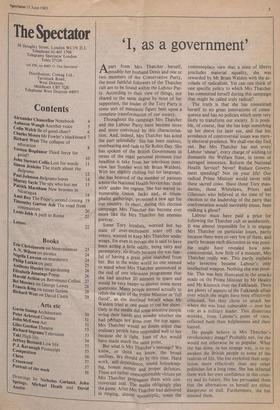`I, as a government'
Apart from Mrs Thatcher herself, possibly her husband Denis and one or two members of the Conservative Party, the most faithful followers of the Thatcher cult are to be found within the Labour Par- ty. According to their view of things, not shared to the same degree by most of her supporters, the leader of the Tory Party is some sort of messianic figure bent upon a complete transformation of our society.
Throughout the campaign Mrs Thatcher and the Labour Party have become more and more convinced by this characterisa- tion. And, indeed, Mrs Thatcher has acted the part splendidly. She has been zealous, overbearing and rude to Sir Robin Day. She has spoken of the British Government in terms of the regal personal pronoun (our headline is take from her television inter- view last Sunday with Mr Brian Walden). With her slightly chilling feel for language, she has boasted of the number of patients whom the National Health Service has 'dealt with' under her regime. She has waved in- numerable Union Jacks and, at trium- phalist gatherings, promised a new age for our country. In short, during this election campaign Mrs Thatcher has become ever more like the Mrs Thatcher her enemies portray.
Some Tory loyalists, worried lest her state of over-excitement scare off the voters, wanted to keep Mrs Thatcher under wraps, for even in private she is said to have been acting a little oddly, being ratty and peremptory, no doubt because she was fear- ful of having a great prize snatched from her. But in the wider world no one seemed to mind when Mrs Thatcher announced at the end of one television programme that she had another 20 minutes to spare and would be very happy to answer some more questions. Many people seemed actually to relish the sight of the Prime Minister in 'full flood', as she decribed herself when Mr Walden tried at one point to cut her short. Only in the media did some sensitive people wring their hands and wonder whether she had perhaps not gone over the top again. Mrs Thatcher would no doubt argue that ordinary people have responded well to her because she is right. Joan of Arc would have made much the same point. But what is Mrs Thatcher's message? We know, or think we know, the broad outlines. We should do by this time. Hard work, self-dependence, sound housekeep- ing, honest money and proper defences. These are rather unexceptionable virtues yet Mrs Thatcher propagates them with con- troversial zeal. The media obligingly play the game. After Mrs Thatcher had delivered in ringing, almost apocalyptic, tones the
commonplace view that a state of liberty precludes material equality, she was rewarded by Mr Brian Walden with the ac- colade of radicalism. Yet can one think of one specific policy to which Mrs Thatcher has committed herself during this campaign that might be called truly radical?
The truth is that she has committed herself to no great innovations of conse- quence and has no policies which seem very likely to transform our society. It is possi- ble, of course, that she has kept something up her sleeve for later use, and that her avoidance of controversial issues was mere- ly electoral prudence. We shall one day find, out. But Mrs Thatcher has met every' Labour 'smear', every charge of wishing to dismantle the Welfare State, in terms of outraged innocence. Reform the National Health Service? Never! Reduce Govern- ment spending? Not on your life! Our radical Prime Minister would never milk these sacred cows. Have those Tory man- darins, those Whitelaws, Priors and Gilmours who believed at the time of her election to the leadership of the party that confrontation would inevitably ensue, been stalking a ghost?
Labour must have paid a price for following the Thatcher cult so assiduously. It was almost impossible for it to engage Mrs Thatcher on particular issues, partly because there were so very few of them, and partly because such discussion as was possi- ble might have revealed how non- controversial, how little of a monster, Mrs Thatcher really was. This partly explains why invective became Labour's only intellectual weapon. Nothing else was possi- ble. This was best illustrated in the attacks made on the Prime Minister by Mr Healey and Mr Kinnock over the Falklands. There are plenty of aspects of the Falklands affair over which she might have been effectively criticised, but they chose to attack her where she was least vulnerable — over her role as a military leader. This disastrous mistake, , from Labour's point of view, reflected both their helplessness and their hatred.
Do people believe in Mrs Thatcher's revolutionary image? Probably not, for she would not otherwise be so popular. What she has done, in her strange way, is to re- awaken the British people to some of the realities of life. She has exploited their scep- ticism more effectively than any other politician for a long time. She has infected them with her own confidence in this coun- try and its future. She has persuaded them that the alternatives to herself are either dangerous or dull. Furthermore, she has amused them.










































 Previous page
Previous page